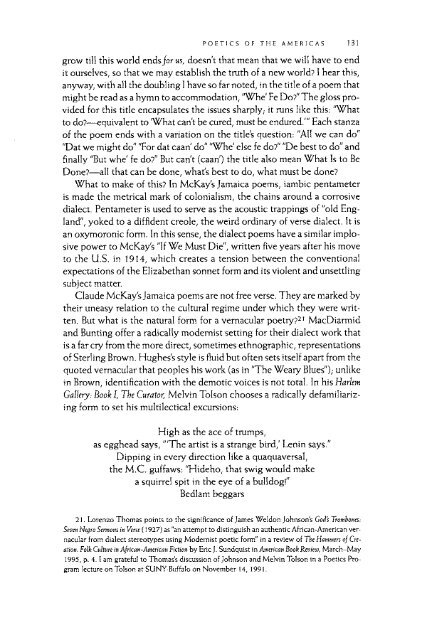My Way_ Speeches and Poems - Charles Bernstein
My Way_ Speeches and Poems - Charles Bernstein
My Way_ Speeches and Poems - Charles Bernstein
Create successful ePaper yourself
Turn your PDF publications into a flip-book with our unique Google optimized e-Paper software.
POETICS OF THE AMERICAS 131<br />
grow till this world ends for us, doesn't that mean that we will have to end<br />
it ourselves, so that we may establish the truth of a new world? I hear this,<br />
anyway, with all the doubling I have so far noted, in the title of a poem that<br />
might be read as a hymn to accommodation, IIWhe' Fe Do?" The gloss provided<br />
for this title encapsulates the issues sharply; it runs like this: IIWhat<br />
to do?---equivalent to What can't be cured, must be endured.'" Each stanza<br />
of the poem ends with a variation on the title's question: IIAll we can do"<br />
IIDat we might doll "For dat caan' do" IIWhe' else fe doi' IIDe best to do" <strong>and</strong><br />
finally "But whe' fe do?" But can't (caan') the title also mean What Is to Be<br />
Done?-all that can be done, what's best to do, what must be done?<br />
What to make of this? In McKay's Jamaica poems, iambic pentameter<br />
is made the metrical mark of colonialism, the chains around a corrosive<br />
dialect. Pentameter is used to serve as the acoustic trappings of "old Engl<strong>and</strong>",<br />
yoked to a diffident creole, the weird ordinary of verse dialect. It is<br />
an oxymoronic form. In this sense, the dialect poems have a similar implosive<br />
power to McKay's IIIf We Must Die", written five years after his move<br />
to the U.S. in 1914, which creates a tension between the conventional<br />
expectations of the Elizabethan sonnet form <strong>and</strong> its violent <strong>and</strong> unsettling<br />
subject matter.<br />
Claude McKay's Jamaica poems are not free verse. They are marked by<br />
their uneasy relation to the cultural regime under which they were written.<br />
But what is the natural form for a vernacular poetry?21 MacDiarmid<br />
<strong>and</strong> Bunting offer a radically modernist setting for their dialect work that<br />
is a far cry from the more direct, sometimes ethnographic, representations<br />
of Sterling Brown. Hughes's style is fluid but often sets itself apart from the<br />
quoted vernacular that peoples his work (as in "The Weary Blues"); unlike<br />
in Brown, identification with the demotic voices is not total. In his Harlem<br />
Gallery: Book I, The Curator, Melvin Tolson chooses a radically defamiliarizing<br />
form to set his multilectical excursions:<br />
High as the ace of trumps,<br />
as egghead says, '''The artist is a strange bird,' Lenin says."<br />
Dipping in every direction like a quaquaversal,<br />
the M.e. guffaws: "Hideho, that swig would make<br />
a squirrel spit in the eye of a bulldog!"<br />
Bedlam beggars<br />
21. Lorenzo Thomas points to the significance of James Weldon Johnson's Gods Trombones:<br />
Seven Negro Sermons in Verse (1927) as "an attempt to distinguish an authentic African-American vernacular<br />
from dialect stereotypes using Modernist poetic form" in a review of The Hammers of Creation:<br />
Folk Culture in African-American Fiction by Eric J. Sundquist in American Book Review, March-May<br />
1995, p. 4. I am grateful to Thomas's discussion of Johnson <strong>and</strong> Melvin Tolson in a Poetics Program<br />
lecture on Tolson at SUNY-Buffalo on November 14,1991.


